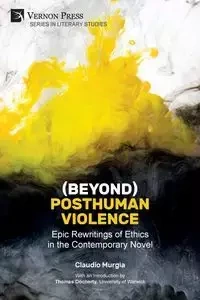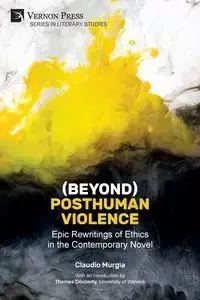(Beyond) Posthuman Violence - Claudio Murgia
- Epic Rewritings of Ethics in the Contemporary Novel
Neuroscience tells us that the brain is nothing but a metaphor machine capable of extracting meaning from a chaotic reality. Following Agamben, Arendt, Benjamin and Žižek, a theory of violence can be established according to which violence is a reaction on the part of the individual to the frustration generated by having her metaphor machine suppressed by the mythic narrative of the Law. In opposition to mythic violence, Benjamin posits the justice of divine violence. Divine justice is an excess of life, the very uniqueness of the metaphor machine.
The individual is affected by a difficulty to communicate her metaphor machine to the Other, as if it were inexpressible. This work explores how the characters in the works of David Foster Wallace, Cormac MacCarthy, J. G. Ballard, Bret Easton Ellis, Chuck Palahniuk, William Gibson, Neal Stephenson, Maurice G. Dantec and China Mieville suffer from these limits of language and the constrictions of the Law. Through violence they look for their individual Voice, intended as their will-to-say, the ‘pure taking place of language’ (Agamben). In their struggle to be heard these characters are however deaf to the Voice of the Other.
There is a need for a new Ethics of Narratives expressed through an Epic of the Voice founded on the will-to-listen, along the lines of the concept of the posthuman theorized by Rosi Braidotti. Here subjectivity is a process of constant autopoiesis dependent on the relationship the individual has with the Other and the environment around her, that is, in the reciprocal will-to-say and will-to-listen. Human beings can meet in the taking-place of language, in the place before the suppressive language of the Law is even born, in a meeting of Voices.
EAN: 9781622737819




Neuroscience tells us that the brain is nothing but a metaphor machine capable of extracting meaning from a chaotic reality. Following Agamben, Arendt, Benjamin and Žižek, a theory of violence can be established according to which violence is a reaction on the part of the individual to the frustration generated by having her metaphor machine suppressed by the mythic narrative of the Law. In opposition to mythic violence, Benjamin posits the justice of divine violence. Divine justice is an excess of life, the very uniqueness of the metaphor machine.
The individual is affected by a difficulty to communicate her metaphor machine to the Other, as if it were inexpressible. This work explores how the characters in the works of David Foster Wallace, Cormac MacCarthy, J. G. Ballard, Bret Easton Ellis, Chuck Palahniuk, William Gibson, Neal Stephenson, Maurice G. Dantec and China Mieville suffer from these limits of language and the constrictions of the Law. Through violence they look for their individual Voice, intended as their will-to-say, the ‘pure taking place of language’ (Agamben). In their struggle to be heard these characters are however deaf to the Voice of the Other.
There is a need for a new Ethics of Narratives expressed through an Epic of the Voice founded on the will-to-listen, along the lines of the concept of the posthuman theorized by Rosi Braidotti. Here subjectivity is a process of constant autopoiesis dependent on the relationship the individual has with the Other and the environment around her, that is, in the reciprocal will-to-say and will-to-listen. Human beings can meet in the taking-place of language, in the place before the suppressive language of the Law is even born, in a meeting of Voices.
EAN: 9781622737819

